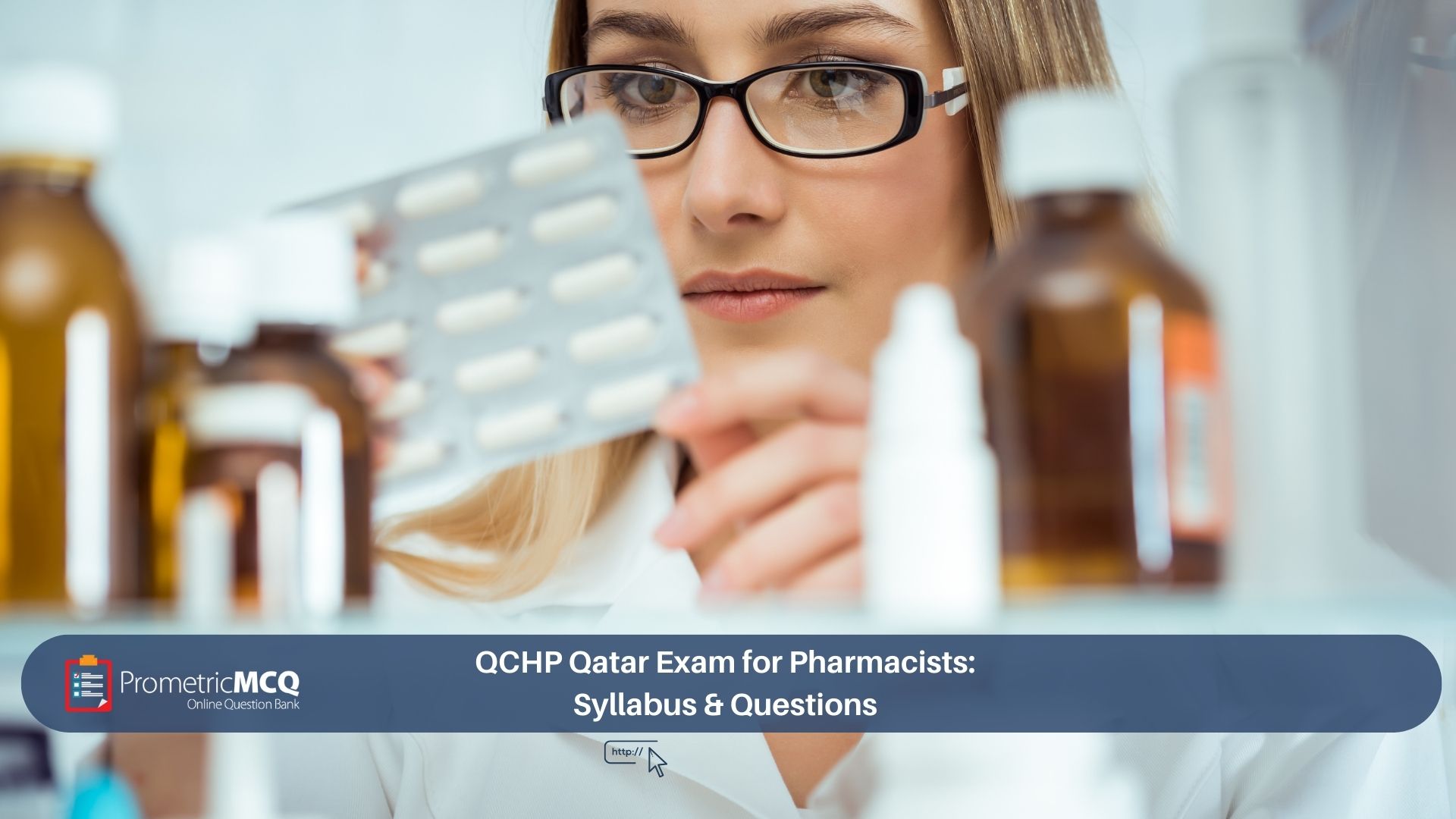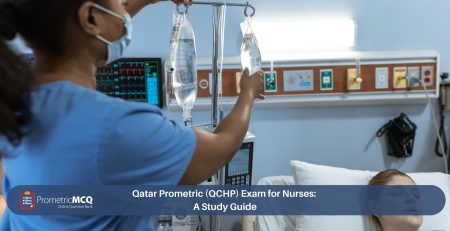
QCHP Qatar Exam for Pharmacists: Syllabus & Questions
fatima@prometricmcq.com2025-09-26T18:46:19+00:00Table of Contents
ToggleQCHP Qatar Exam for Pharmacists: Syllabus & Questions (2025)
Qatar’s healthcare sector stands as a testament to the nation’s vision, boasting some of the most advanced medical facilities and highest standards of care in the world. For pharmacists seeking to be part of this dynamic environment, the career opportunities are immense. However, entry into this prestigious field is governed by a stringent quality assurance process, at the center of which is the Qatar Council for Healthcare Practitioners (QCHP) Pharmacy Exam. This Prometric-administered test is the definitive benchmark, ensuring every pharmacist practicing in Qatar possesses the clinical knowledge and competency required to provide safe and effective patient care.
The QCHP Pharmacy Exam is a far cry from a traditional academic test. It is a rigorous, case-based assessment designed to evaluate your ability to apply pharmaceutical knowledge in real-world clinical scenarios. The exam’s Multiple-Choice Questions (MCQs) will challenge your clinical judgment, your precision in pharmaceutical calculations, and your understanding of both international therapeutic guidelines and local regulations. Success demands more than rote memorization; it requires a strategic, question-focused preparation strategy.
This ultimate 2025 guide is your comprehensive blueprint for conquering the QCHP Pharmacy Exam. We will provide a meticulous breakdown of the exam syllabus, focusing on the high-yield topics that frequently appear. You will find a collection of free, high-quality sample questions, each with an in-depth answer and rationale to hone your analytical skills. Finally, a robust 10-point FAQ section will provide clear answers to all your logistical and strategic questions, ensuring you are fully prepared for every aspect of the exam process.
Key Takeaways for the QCHP Pharmacy Exam
- Clinical Therapeutics is Core: A deep understanding of pharmacotherapy for common chronic diseases (e.g., diabetes, hypertension, asthma) is the largest part of the exam.
- Calculations Must Be Flawless: You must achieve 100% accuracy on all pharmaceutical calculation questions. There is no room for error.
- Know Qatar’s Pharmacy Law: A unique and critical component of the exam tests your knowledge of local regulations, especially concerning controlled and semi-controlled drugs.
- Brand vs. Generic Names: The exam uses generic (non-proprietary) names for all drugs. You must be proficient with them.
- MCQ Practice is Non-Negotiable: The single most effective study method is to solve thousands of case-based questions from a high-quality, specialized QBank.
Deconstructing the 2025 QCHP Pharmacy Exam Syllabus and Pattern
A successful preparation strategy starts with a thorough understanding of the exam’s structure and content. Knowing what to expect is the first step in building a targeted study plan. For a broader overview, you can review our general QCHP Qatar Prometric exam preparation tips.
Exam Format and Structure
- Administrator: Prometric
- Format: Computer-Based Test (CBT)
- Structure: 150 Multiple-Choice Questions (MCQs)
- Duration: 3 hours (180 minutes)
- Scoring: Pass/Fail result, with an unofficial passing threshold of around 60%. There is no negative marking.
Syllabus Breakdown: A High-Yield Focus
The QCHP exam for pharmacists is comprehensive, but a smart candidate will focus their energy on the most heavily weighted domains.
| Pharmacy Domain | High-Yield Topics and Key Concepts for 2025 |
|---|---|
| Clinical Pharmacy & Therapeutics (Approx. 50-60%) | This is the most significant domain. You must have in-depth knowledge of the pharmacotherapy of common diseases: Cardiovascular (Hypertension, Heart Failure, Dyslipidemia, ACS), Endocrine (Diabetes Type 1 & 2, Thyroid disorders), Infectious Diseases (Antibiotic spectrum of activity, management of common infections), Pulmonary (Asthma, COPD), Gastrointestinal (PUD, GERD), and more. |
| Pharmaceutical Sciences (Approx. 20-25%) | This covers the foundational sciences. Pharmacology: Mechanism of action, adverse effects, and drug interactions of major drug classes. Pharmaceutics: Dosage forms, biopharmaceutics, and pharmacokinetics (half-life, clearance, volume of distribution). |
| Pharmacy Practice, Calculations & Law (Approx. 20-25%) | Calculations: This is a critical area. You must be an expert in allegations, dilutions, dosage calculations, and infusion rate calculations. Dispensing & Counseling: Patient counseling points for common medications, medication reconciliation. Qatar Pharmacy Law: This is a unique and vital component. You must know the regulations regarding the dispensing of controlled, semi-controlled, and narcotic drugs. |
Free QCHP Pharmacy Exam: Sample Questions and Answers
The best way to translate theory into a passing score is to practice with realistic exam questions. Analyze the following scenarios and their detailed rationales to understand the level of critical thinking required. For a more exhaustive preparation, a dedicated QBank of Pharmacy MCQs is essential.
Question 1: Clinical Therapeutics (Cardiology)
A 62-year-old male patient with a history of hypertension and dyslipidemia is started on atorvastatin 40 mg daily. Two months later, he complains of significant muscle pain and weakness in his legs. His lab results show a creatine kinase (CK) level that is 12 times the upper limit of normal. What is the most appropriate action?
- Decrease the dose of atorvastatin to 20 mg daily.
- Discontinue the atorvastatin immediately.
- Switch the patient to a different statin, such as rosuvastatin.
- Advise the patient to take coenzyme Q10 supplements.
Correct Answer: B (Discontinue the atorvastatin immediately.)
Rationale: This patient is presenting with signs and symptoms of severe statin-induced myopathy, likely rhabdomyolysis. The significant muscle pain combined with a creatine kinase level >10 times the upper limit of normal is a medical emergency. The breakdown of muscle tissue can release myoglobin, which is nephrotoxic and can lead to acute kidney injury. The absolute first and most critical step is to stop the offending agent immediately to prevent further muscle damage.
Why other options are incorrect:
A & C: Simply decreasing the dose or switching to another statin is inappropriate in the setting of rhabdomyolysis. The risk of continued muscle damage is too high. All statin therapy must be stopped.
D: While some evidence suggests CoQ10 might help with mild statin-associated muscle symptoms, it is not a treatment for rhabdomyolysis and would not be the primary intervention.
Question 2: Pharmaceutical Calculation
You are asked to prepare 240 mL of a 2.5% w/v hydrocortisone cream using a 1% w/v hydrocortisone cream and a 5% w/v hydrocortisone cream. How many grams of the 5% cream are needed?
- 90 grams
- 120 grams
- 150 grams
- 180 grams
Correct Answer: A (90 grams)
Rationale: This is a classic alligation problem. You can solve it using the alligation grid method.
1. Place the desired concentration in the center: 2.5%
2. Place the higher concentration (5%) in the top left and the lower concentration (1%) in the bottom left.
3. Subtract diagonally: 5 – 2.5 = 2.5 parts (of the 1% cream). 2.5 – 1 = 1.5 parts (of the 5% cream).
4. Total parts = 2.5 + 1.5 = 4 parts.
5. The proportion of the 5% cream needed is 1.5 parts out of 4 total parts.
6. Calculate the amount needed: (1.5 / 4) * 240 mL = 90 mL. Since 1 mL of cream is approximately 1 gram, you need 90 grams of the 5% cream.
Question 3: Pharmacy Law & Practice
A patient presents a prescription for Pregabalin 75 mg capsules, #60, with instructions to take one capsule twice daily. You know that in Qatar, Pregabalin is classified as a semi-controlled drug. Which of the following is true regarding dispensing this prescription?
- The prescription is valid for 6 months from the date it was written.
- No refills are permitted on this prescription.
- The prescription can be refilled up to 5 times.
- The patient’s ID is not required to be recorded for this medication.
Correct Answer: B (No refills are permitted on this prescription.)
Rationale: This question tests your knowledge of Qatar’s specific pharmacy regulations. Semi-controlled drugs (which include gabapentinoids like Pregabalin, certain anxiolytics, and antidepressants) have strict dispensing rules. Prescriptions for these medications are typically valid for a short period (e.g., a few days from being written) and are strictly non-refillable. A new prescription is required for every dispense. This is a critical patient safety and regulatory point.
Why other options are incorrect:
A & C: These rules apply to regular, non-controlled prescription drugs, not semi-controlled substances.
D: Recording the patient’s Qatar ID (QID) is a mandatory step for dispensing controlled and semi-controlled medications to ensure proper tracking and prevent abuse.
Frequently Asked Questions (FAQs) for the QCHP Pharmacy Exam
The exam is graded as Pass/Fail. While the QCHP does not publish an official passing percentage, the generally accepted unofficial passing mark is around 60%. To ensure success, you should aim to consistently score over 70% in your practice mock exams.
The clinical science and therapeutics sections are very similar, as they are all based on international evidence-based guidelines. The main difference is the inclusion of a section on Qatar’s specific pharmacy laws and regulations, which is not present in other exams. This makes local law a high-yield topic that must be studied specifically for the QCHP exam.
The official source is the Qatar Council for Healthcare Practitioners (QCHP) website and publications from the Ministry of Public Health. Additionally, high-quality, up-to-date question banks for the QCHP exam will include practice questions specifically on these local laws, which is an excellent way to learn them in a practical context.
You are expected to know the fundamental principles of compounding, including basic calculations, quality assurance, and safety procedures. While it is not as large a section as clinical therapeutics, you should be prepared for questions on this topic, particularly those related to calculations and stability.
The exam exclusively uses generic (international non-proprietary) names. You must be able to recognize drugs by their generic names. For example, you will see “atorvastatin,” not “Lipitor.” For guidance on drug information, resources like the American Society of Health-System Pharmacists (ASHP) Drug Information are a good standard.
Yes, it is mandatory. Primary Source Verification (PSV) is the process where a third-party company, DataFlow, verifies your academic degrees, pharmacy license, and experience certificates directly from the issuing institutions. You must have a positive PSV report before the QCHP will issue your final Qatar QCHP license to practice.
The most effective strategy is active learning using a comprehensive question bank tailored for the QCHP pharmacy exam. Solving and reviewing thousands of MCQs helps you master the vast clinical content, perfect your calculation skills, and learn the local laws in a case-based format.
The QCHP typically allows candidates three attempts to pass the licensing exam. A waiting period is usually required between attempts. If you fail, it is critical to analyze your weak areas and intensify your preparation with a focus on question-based practice before your next attempt.
You don’t need to memorize every single bug for every drug, but you must know the “workhorse” antibiotics and their primary targets. For example, you should know what typically covers gram-positives (like vancomycin for MRSA), gram-negatives (like ceftriaxone), pseudomonas (like piperacillin-tazobactam), and atypicals (like azithromycin).
Do not try to learn new information. Focus on consolidation and simulation. Review your notes on high-yield topics like calculations, controlled drug laws, and top 200 drug classes. Take one final full-length timed mock exam to fine-tune your pacing. In the last 48 hours, prioritize rest, nutrition, and sleep to ensure your brain is sharp and ready.
Conclusion: Your Future in Qatar’s Pharmacy Sector
The QCHP Pharmacy Exam is a challenging but fair assessment of the skills required to be a competent pharmacist in a world-class healthcare system. It rewards deep clinical knowledge, precision, and a commitment to patient safety. By adopting a structured study plan, focusing on the high-yield syllabus areas, and dedicating yourself to a rigorous practice regimen with high-quality MCQs, you can master the content and the format. Passing this exam is the definitive step toward launching a successful and impactful pharmacy career in the vibrant and forward-thinking nation of Qatar.
Ready to Master the Syllabus and Ace Your Exam?
Our comprehensive Pharmacy MCQ package is specifically designed for the Qatar Prometric exam, featuring thousands of clinical cases, calculation problems, and questions on Qatar law, all with detailed rationales to guarantee your success.




